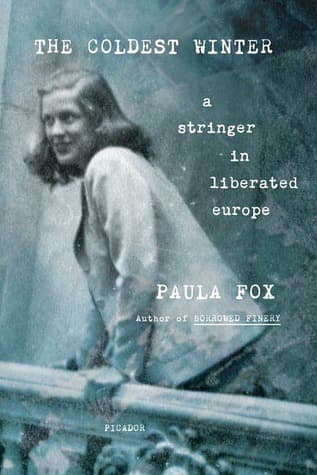
Book Review Summary: The Coldest Winter: A Stringer in Liberated Europe
Introduction
"The Coldest Winter: A Stringer in Liberated Europe" is a memoir by Paula Fox, an American author known for her novels and memoirs. In this book, Fox recounts her experiences as a young journalist traveling through Europe in the aftermath of World War II. With her elegant simplicity and ability to create vivid scenes and characters, Fox takes readers on a journey through devastated cities and encounters with survivors, resistance members, and political strivers. This article will provide an overview of the book, analyze readers' views, and summarize the reasons for recommending and not recommending the book.
About Paula Fox
Paula Fox was an American author of novels for adults and children, as well as two memoirs. Her novel "The Slave Dancer" (1973) received the Newbery Medal in 1974, and in 1978, she was awarded the Hans Christian Andersen Medal. Fox's writing career spanned decades, and she was known for her ability to create memorable characters and evocative settings. Her memoir "Borrowed Finery" explores her childhood experiences, and "The Coldest Winter" follows her travels as a young journalist in post-war Europe.
Analysis of Views
-
Elegant simplicity: Readers appreciate Fox's ability to create a profound impact with minimal words. They find her writing style elegant and admire her ability to convey a wealth of emotions and experiences through concise descriptions.
-
Coming-of-age narrative: The book is not only a bleak portrait of post-war Europe but also a coming-of-age story. Readers find Fox's portrayal of a young woman's journey into the world captivating, as she encounters various characters and grapples with her own identity.
-
Atmospheric memoir: Fox's memoir is heavily atmospheric, immersing readers in the devastation and desolation of post-war Europe. The book provides a glimpse into the lives of survivors, resistance members, and others affected by the war, offering a poignant and thought-provoking perspective on the aftermath of conflict.
-
Travel writing: The book is praised for its beautiful travel writing, which evokes a sense of longing and inspires readers to embark on their own journeys. Fox's descriptions of cities like London, Paris, and Warsaw transport readers to these places, making them feel as if they are experiencing the journey alongside the author.
-
Eye-opening insights: Readers find the book eye-opening and thought-provoking. It sheds light on the challenges faced by individuals in post-war Europe and provides a glimpse into the lives of those who lived through the war. The book highlights the resilience and humanity of people who survived the devastation and offers a powerful reminder of the impact of war on individuals and communities.
Reasons for Recommendation
-
Elegant simplicity: Fox's writing style is praised for its elegance and ability to convey complex emotions with minimal words. Readers appreciate the way she creates vivid scenes and memorable characters in a concise manner.
-
Coming-of-age narrative: The book's coming-of-age theme resonates with readers who enjoy stories about personal growth and self-discovery. Fox's portrayal of a young woman navigating her way through post-war Europe adds depth to the narrative and makes it relatable to readers of all ages.
-
Atmospheric memoir: The book's atmospheric quality immerses readers in the post-war landscape of Europe, providing a visceral experience of the devastation and despair that characterized the period. Readers appreciate the way Fox brings the era to life through her vivid descriptions and evocative prose.
-
Travel writing: The book's beautiful travel writing captures the essence of exploration and discovery. Readers find it inspiring and are drawn to Fox's ability to transport them to different locations through her descriptions. The book offers a unique perspective on Europe during this time period, making it an interesting read for those interested in history or travel.
Reasons for Not Recommendation
-
Disorganization: Some readers find the book disorganized and feel that the stories about post-war Europe are interrupted by flashbacks or abrupt transitions. They find it challenging to follow the narrative flow and wish for a more cohesive structure.
-
Lack of overarching narrative: Some readers feel that the book lacks an overarching narrative or a clear purpose. They find it difficult to connect with the individual stories presented in the memoir, which may contribute to their lack of engagement with the book.
Conclusion
"The Coldest Winter: A Stringer in Liberated Europe" by Paula Fox is a memoir that offers a poignant portrayal of post-war Europe through the eyes of a young journalist. With its elegant simplicity, coming-of-age narrative, atmospheric prose, and travel writing style, the book has captured the hearts of many readers. While some find it disorganized or lacking in an overarching narrative, others appreciate its ability to evoke empathy, provide eye-opening insights, and transport readers to a different time and place. Overall, "The Coldest Winter" is recommended for those who enjoy memoirs that explore personal growth, historical context, and evocative storytelling.